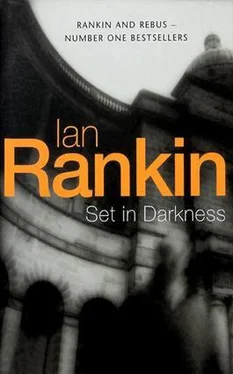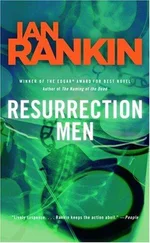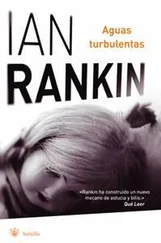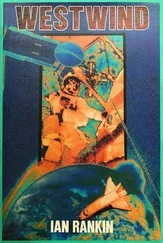It wasn’t even close. Thirty-three said Yes, 31 No. The turnout was just under 64 per cent. The result, as one paper put it, was ‘a nation divided’. The SNP withdrew their support for the Callaghan government — he called them ‘turkeys voting for Christmas’ — an election had to be called, and the Conservatives came back into power, led by Margaret Thatcher.
‘Your SNP did that,’ Rebus told Rhona. ‘Now where’s your devolution?’
She just shrugged a response, beyond goading. They’d come a long way since the cushion fights on the floor. He turned to his work instead, immersing himself in other people’s lives, other people’s problems and miseries.
And hadn’t voted in an election since.
After Josephine Banks had gone, he returned to the Murder Room. DS ‘Hi-Ho’ Silvers was making telephone calls. So were a couple of DCs who’d been brought in from other divisions. Chief Inspector Gill Templer was having a confab with the Farmer. A WPC walked past and handed the Farmer a sheaf of telephone messages — so many they were held by a bulldog clip. The Farmer frowned at them, went on listening to Templer. The Farmer’s jacket was off and the sleeves of his white shirt were rolled up. All around Rebus people were moving, and computer keyboards were being hammered, and ringing phones were being answered. On his desk were copies of inquiry transcripts, initial interviews with the members of the clan. Cammo Grieve had drawn the short straw, ended up under the inquisitorial gaze of Bobby Hogan and Joe Dickie.
Cammo Grieve: Any idea how long this will take?
Hogan: Sorry, sir. Don’t mean to inconvenience you.
Grieve: My brother’s been murdered, you know!
Hogan: Why else would we be talking to you, sir?
(Rebus had to smile: Bobby Hogan had a way of saying ‘sir’ that made it sound like an insult.)
Dickie: You went back down to London on the Saturday, Mr Grieve?
Grieve: First bloody chance I could.
Dickie: You don’t get on with your family?
Grieve: None of your bloody business.
Hogan: (To Dickie) Put down that Mr Grieve refused to answer.
Grieve: For Christ’s sake!
Hogan: No need to take Our Lord’s name in vain, sir.
(Rebus laughed out loud this time. Apart from the usual trinity — weddings, funerals and christenings — he doubted Bobby Hogan had ever seen the inside of a church.)
Grieve: Look, let’s just get on with it, shall we?
Dickie: Couldn’t agree more, sir.
Grieve: I was back in London Saturday night. You can check with my wife. We spent Sunday together, except when I had some constituency business to discuss with my agent. Couple of friends joined us for dinner. Monday morning, I was on my way to the House when I got the call on my mobile to say Roddy was dead.
Hogan: And how did you feel, sir...?
On it went, Cammo Grieve combative, Hogan and Dickie soaking up his hostility like a sponge, hitting back with questions and comments that illustrated their feelings towards him.
As Hogan had commented afterwards — strictly off the record — ‘Only time that shite would get a cross from me was if he had fangs.’
Lorna Grieve and her partner had, individually, faced up to the easier pairing of DI Bill Pryde and DS Roy Frazer. Neither had seen Roddy on the Sunday. Lorna had gone to visit friends in North Berwick, while Hugh Cordover had busied himself in his home-based studio, with an engineer and various band members as witnesses.
There were still no sightings of Roddy Grieve on the Sunday night, when he’d supposedly been out for a drink with friends. No friends seemed to have seen him. The implication was: Roddy had enjoyed a secret life, something apart from his marriage. And this, by its very nature, would give the investigation all sorts of problems.
Because no matter how hard you tried, some secrets were bound to stay unrevealed.
The building society was on George Street. When Siobhan Clarke had first arrived in Edinburgh, George Street had seemed a windy ghetto of stunning architecture and sluggish business. Half the office space seemed to be empty, with To Let notices strung like pennants from the buildings. Now the street was changing, upmarket shops being joined by a string of bars and restaurants, most of them housed in what had been banks.
That C. Mackie’s building society was still trading seemed, under the circumstances, a minor miracle. Clarke sat in the manager’s office while he found the relevant paperwork. Mr Robertson was a small, rotund man with a large, polished head and beaming smile. The half-moon glasses gave him the appearance of a Dickensian clerk. Clarke tied not to imagine him in period clothes, but failed. He took her smile as one of approbation — either of his character in general or his efficiency — and sat back down at his modern desk in his modern office. The manila file was slim.
‘The C stands for Christopher,’ he remarked.
‘Mystery solved,’ Clarke said, opening her notebook. Mr Robertson beamed at her.
‘The account was opened in the March of 1980. The fifteenth, to be precise, a Saturday. I’m afraid I wasn’t the manager then.’
‘Who was?’
‘My predecessor, George Samuels. I wasn’t even at this branch, prior to my elevation.’
Clarke flipped through Christopher Mackie’s passbook. ‘The opening balance was £430,000?’
Robertson checked the figures. ‘That is correct. Thereafter, we have a history of occasional minor withdrawals and annual interest.’
‘You knew Mr Mackie?’
‘No, I don’t believe so. I took the liberty of asking the staff.’ He ran his fingers down the columns of figures. ‘You say he was a tramp?’
‘His clothing would suggest he was homeless.’
‘Well, I know house prices are extortionate, but all the same...’
‘With four hundred thousand to spare, he might have found himself something?’
‘With that sort of money, he might have found just about anything.’ He paused. ‘But then there is this address in the Grassmarket.’
‘I’ll be going there later, sir.’
Robertson nodded distractedly. ‘One of the staff, our Mrs Briggs. He seemed to deal with her when he made a withdrawal.’
‘I’d like to talk to her.’
He nodded again. ‘I presumed as much. She’s ready for you.’
Clarke looked at her pad. ‘Has his address changed at all, while he’s been a customer here?’
Robertson peered at the paperwork. ‘It would seem not,’ he said at last.
‘Didn’t it seem unusual to you, sir: that amount of money in the one account?’
‘We did write to Mr Mackie from time to time, asking if he’d like to discuss other options. Thing is, you can’t be too pushy.’
‘Or the customer might take umbrage?’
Mr Robertson nodded. ‘This is a wealthy place, you know. Mr Mackie wasn’t the only one with that kind of cash at his disposal.’
‘Thing is, sir, he didn’t dispose of it.’
‘Which brings me to another point...’
‘We haven’t found anything resembling a will, if that’s what you’re getting at.’
‘And no next of kin?’
‘Mr Robertson, I didn’t even have a first name till you gave me one.’ Clarke closed her notebook. ‘I’ll talk to Mrs Briggs now, if I may.’
Valerie Briggs was a middle-aged woman who’d recently had her hair restyled. Clarke guessed as much from the way Mrs Briggs kept touching a hand to her head, as if not quite believing the shape and texture.
‘The very first time he came in here, it was me he talked to.’ A cup of tea had been provided for Mrs Briggs. She looked at it uncertainly: tea in her boss’s office was, like her hairstyle, a new and challenging experience. ‘Said he wanted to open an account and who should he speak to. So I gave him the form and off he went. Came back with it filled in and asked if he could open the account with cash. I thought he’d made a mistake, put down too many noughts.’
Читать дальше












